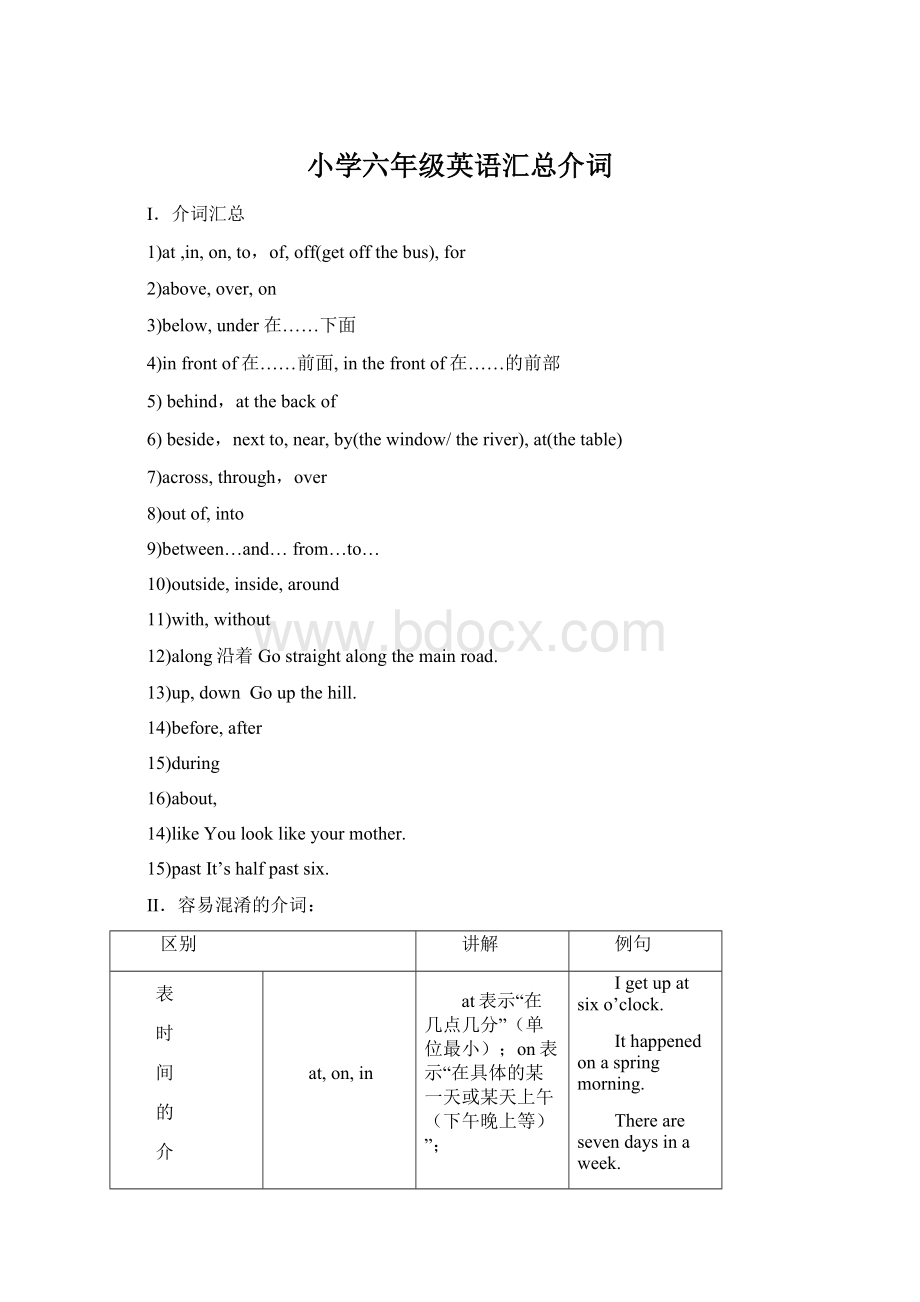小学六年级英语汇总介词.docx
《小学六年级英语汇总介词.docx》由会员分享,可在线阅读,更多相关《小学六年级英语汇总介词.docx(15页珍藏版)》请在冰豆网上搜索。

小学六年级英语汇总介词
I.介词汇总
1)at,in,on,to,of,off(getoffthebus),for
2)above,over,on
3)below,under在……下面
4)infrontof在……前面,inthefrontof在……的前部
5)behind,atthebackof
6)beside,nextto,near,by(thewindow/theriver),at(thetable)
7)across,through,over
8)outof,into
9)between…and…from…to…
10)outside,inside,around
11)with,without
12)along沿着Gostraightalongthemainroad.
13)up,downGoupthehill.
14)before,after
15)during
16)about,
14)likeYoulooklikeyourmother.
15)pastIt’shalfpastsix.
II.容易混淆的介词:
区别
讲解
例句
表
时
间
的
介
词
at,on,in
at表示“在几点几分”(单位最小);on表示“在具体的某一天或某天上午(下午晚上等)”;
in表示“在几天、周、月、年”。
Igetupatsixo’clock.
Ithappenedonaspringmorning.
Therearesevendaysinaweek.
inthemorning/evening/afternoon;atnoon/night/dawn/sunrise/sunset/lunch/dinner/supper,etc.
during,for,in
for后加一个“表时间段的具体单位(常用复数)”;during强调“持续”或“某活动”期间;in指在一段时间内。
Shehaslivedhereforsixyears.
HewasinTianjinduringtheholidays.
Inthosedayshewaspoor.
till,until
till/until构成的短语修饰“持续性动词”,“非持续性动词”要用“否定式”。
Theywaitedtill/until10:
00.
Theydidn’tleaveuntil/till10:
00.
after,since
“after+时刻或时段”,“…以后”,终点时间在过去或将来;而“since+时间点”,“自从…以来”,终点在说话的时刻。
She’llbebackaftereighto’clock.
She’slivedheresince2002.
in,after
“in+时段”,“…以后”,用于将来时;“after+时刻或时段”,“…以后”可用于将来时或过去时。
He’llleaveafter11:
00.
Heleftafter11:
00.
Sheleftafterafewhours.
She’llbebackinhalfanhour.
表
空
间
位
置
及
方
向
方
位
的
介
词
at,on,in
at指一个“点”或“小地方”;
in指一个“地区”或“大地方”空间内;on在某一平面或线上面。
Theyarrivedatthevillageatten.
Yourpencilisinthedesk.
Yourpencilisonthedesk.
on,above,over
on“与物体接触”反义词为“beneath”;over“在…正上方”反义为“under”;above“在…的上方”反义词为“below”。
There’sabookonthedeskandapenbeneaththebook.
There’salampoverthedeskandabagunderthetable.
Jack’sbedroomisabovemineonthesecondfloor.
over,across,through
across“表面跨过”;
through“从中间或从头至尾穿过”;
over“从上空越过”。
He’sswimmingacrosstheriver.
Theywalkedthroughthegate.
Aplaneisflyingoverthecity.
Heiswalkingoverthebridge.
at,beside,by,nextto,near
at靠得“最近”;
beside“在并排一条线上”;
by“在并排一条线上”;
nextto“在顺序上紧靠旁边”;
near靠得“最远”,不表明确方向或顺序。
Let’smeetattheschoolgate.
Thebuildingbesidethelibraryistheshoppingcenter.
TheboystandingbymysideisfromShanghai.
Who’ssittingnextto/besideMr.Steve?
about,round,around.
about表示周围是随意的,不规则的;round或around(二者无多大差别)的周围则是较完整的一个圈。
Don’tleavethetoysaboutthemeeting-room.
Theyaresittinground/aroundthetable.
to,for,at
to“运动的方向,目的地”;
for“动身出发的目的地”;
at“有意攻击的目标”。
Throwittome.
He’llleaveforShanghai.
Hethrewtheballatthatboy.
up,down
up指“往上,往北,大地方,靠拢”;
down指“向下,往南,向小地方,往开走”但在一市区,去中心区用down,去郊区等用up。
Theyaregoingupthehill.
Theyaregoingdownriver.
I’mgoingdowntownshopping.
on,in,to
in表“在某地区内”;
on表“接壤”;
to表“在某地区以外”。
ShanghaiisinthesouthofChina.
HunanliesonthenorthofGuangdong.
XichangliestothesouthwestofChengdu.
between,among
between指“两者之间”;
among指“在三者以上之间”。
There’sariverbetweenthetwovillages.
There’sasmallhouseamongthetrees.
besides
except
exceptfor
exceptthat
but
butfor
besides“除…之外还有,”实际不排除;
except“除…外”表“排除”,不放在句首;
exceptfor表整体肯定补充细节,表除去整体中的一部分;
exceptthat“除了…外”,后接从句;
but通常与all,no,every,where,whowhat及有些它们的合成词连用;butfor“要不是”,后面句子常用虚拟语气。
Ilovemusicbesidessports.
Thehouseisneverusedexceptinwinter.
Thebusisemptyexceptforanoldwoman.
Idon’tknowPeterexceptthathe’sanJapanese.
There’snothingbutachairintheroom.
Butforyourhelp,Iwouldn’thavefinishedmyhomework.
表
原
因
的
介
词
of
for
from/outof
from
at
of常与fond,proud,tired连用表情绪上的原因;
for表奖惩痛苦出名的原因,或内在心里的原因;
from/outof“出于某需要,动机,认识”等原因;
from还可指自然,直接的原因;
at常指感情上的原因。
I’mproudofhavingyouasafriend.
He’sfamousforhiswriting.
Theyaresufferingfromstarvation.
Shefellillfromdrinkinguncleanwater.
Hismotherisangryathislaziness.
表
方
式
的
介
词
by
on/in
with
in
through
by表“用交通工具”或表“发出某动作”;
on/in表用某交通工具;
with用具体的“工具、材料”或伴随“抽象事物”;
in用原料或语言;
through通过具体过程,途径,手段,中介。
Igotoschoolbybus.
Igotoschoolonabike.
Iwritewithapen.
CanyousayitinEnglish?
Youshouldwriteinink(墨水).
Ilearneditthroughafriend.
1.表示地点位置的介词
1)at,in,on,to,for
at
(1)表示在小地方;
(2)表示“在……附近,旁边”
in
(1)表示在大地方;
(2)表示“在…范围之内”。
on表示毗邻,接壤,“在……上面”。
to表示在……范围外,不强调是否接壤;或“到……”
2)above,over,on在……上
above指在……上方,不强调是否垂直,与below相对;
over指垂直的上方,与under相对,但over与物体有一定的空间,不直接接触。
on表示某物体上面并与之接触。
Thebirdisflyingabovemyhead.
Thereisabridgeovertheriver.
Heputhiswatchonthedesk.
3)below,under在……下面
under表示在…正下方
below表示在……下,不一定在正下方
Thereisacatunderthetable.
Pleasewriteyournamebelowtheline.
4)infront[frant]of,inthefrontof在……前面
infrontof…意思是“在……前面”,指甲物在乙物之前,两者互不包括;其反义词是behind(在……的后面)。
Therearesomeflowersinfrontofthehouse.(房子前面有些花卉。
)
inthefrontof意思是“在…..的前部”,即甲物在乙物的内部.反义词是atthebackof…(在……范围内的后部)。
Thereisablackboardinthefrontofourclassroom.
我们的教室前边有一块黑板。
Ourteacherstandsinthefrontoftheclassroom.
我们的老师站在教室前.(老师在教室里)
5)beside,behind
beside表示在……旁边
behind表示在……后面
2.表示时间的介词
1)in,on,at在……时
in表示较长时间,如世纪、朝代、时代、年、季节、月及一般(非特指)的早、中、晚等。
如inthe20thcentury,inthe1950s,in1989,insummer,inJanuary,inthemorning,inone’slife,inone’sthirties等。
on表示具体某一天及其早、中、晚。
如onMay1st,onMonday,onNewYear’sDay,onacoldnightinJanuary,onafinemorning,onSundayafternoon等。
at表示某一时刻或较短暂的时间,或泛指圣诞节,复活节等。
如at3:
20,atthistimeofyear,atthebeginningof,attheendof…,attheageof…,atChristmas,atnight,atnoon,atthismoment等。
注意:
在last,next,this,that,some,every等词之前一律不用介词。
如:
Wemeeteveryday.
2)in,after在……之后
“in+段时间”表示将来的一段时间以后;
“after+段时间”表示过去的一段时间以后;
“after+将来的时间点”表示将来的某一时刻以后。
3)from,since自从……
from仅说明什么时候开始,不说明某动作或情况持续多久;
since表示某动作或情况持续至说话时刻,通常与完成时连用。
since表示"自(某具体时间)以来",常用作完成时态谓语
的时间状语。
sinceliberation(1980)自从解放(1980年)以来Theyhavebeenclosefriendssincechildhood.
他们从小就是好朋友。
(1)sincethewar是指"自从战争结束以来",若指"自从战争开始以来",须说"since
thebeginningofthewar"。
(2)不要将since与after混淆。
比较:
Hehasworkedheresince1965.(指一段时间,强调时间段)自从1965年以来,他一直在这儿工作。
Hebegantoworkhereafter1965.
(指一点时间,强调时间点)从1965年以后,他开始在这儿工作。
4)after,behind在……之后
after主要用于表示时间;
behind主要用于表示位置。
时间名词前介词用法口诀
年前周前要用in
具体日子要用on
遇到几号也用on
上午下午得是in
要说某日上下午
用on换in记清楚
午夜黄昏用at
黎明用它也不错
at用在时分前
说“差”可要用上to
说"过''要用past
3.表示运动方向的介词:
across,through通过,穿过
across表示横过,即从物体表面通过,与on有关,为二维
through穿过,即从物体内部穿过,与in有关,为三维。
4.表示“在……之间”的介词:
表示“在……之间”的介词在英语中属于方位介词,如infrontof,behind,on,in,near,under,up
between,among
between指在两个人或两个事物之间;
among指在三个或三个以上的人或事物之间。
5.表示其他意义的介词
1)on,about关于
on表示这本书,这篇文章或演说是严肃的,或学术性的,可供专门研究这一问题的人阅读;
about表示内容较为普通,不那么正式。
2)by,with,in表示方法、手段、工具
by以……方法、手段或泛指某种交通工具;
with表示用…工具、手段,一般接具体的工具和手段;
in表示用…方式,用…语言(语调、笔墨、颜色)等;
3)except,besides除了
except除……之外,不包括在内;
besides除……之外,包括在内。
ExceptforMr.Wang,wewenttoseethefilm.(王先生没去)
BesidesMr.Wang,wealsowenttoseethefilm.(王先生也去了)
27)near靠近....。
Therearesomeflowersnearthehouse.
房子附近有一些花。
28)of...的,属于...。
ThisisamapofChina.
这是一张中国地图。
29)off离开...,在...之外。
Theyoungmangotoffthetrainquickly.
那个年青人很快下了火车。
Iliveinavillagealittlewayoffthemainroad.
我住在离大路不远的一个村庄里。
30)on在...之上。
Mybookisonthetable.
我的书在桌子上。
31)outof从...出来,在...之外。
Thedogrunoutofthehouse.
狗从房子里跑出来。
32)outside...外边.
Theyarewaitingoutsidethegate.
他们在门外等着。
33)over在...之上,遍于...之上,越过...。
Thereisalightoverthedesk.
桌子上方有盏灯。
Heisoversixtyyearsold.
他有六十多岁。
34)past越过...,过...,超越...。
Thestudentswalkedpastthepostoffice.
学生们走过了邮局。
Itistenpasttwo.
现在是两点十分。
35)round围着...,绕过...,在...周围。
Wesatroundthetable.
我们围着桌子坐下。
Theearthgoesroundthesun.
地球绕着太阳转。
36)since自...以后,自...以来。
HehasmadegreatprogressinEnglishsincehecameintothecollege.
从他来到大学后,他的英语有了很大进步。
37)through经过...,穿过...。
(立体层面)
Theywentthroughtheforest.
他们穿过了森林。
38)throughout遍及...,在各处。
Thepolicesearchedforthecriminalthroughoutthemountain.
警察搜山寻找犯人。
39)till直到...,在...以前。
Hedidn'tcomebacktilleleveno'clock.
他直到十一点钟才回来。
We'llbehometillsix.
六点以前我们都会在家。
40)to到...,向...,趋于。
Howlongisitfromheretothestation?
从这儿到车站有多远?
41)under在...之下,低于。
Therearesomefootballsunderthebed.
床底下有几颗足球。
Thesestudentsareunderseventeenyearsold.
这些学生们不到十七岁。
42)until直到,在...以前,
Pleasewaitforusuntilwecomeback.
请等着我们回来。
ItwasnotuntillastweekthatIhandedinmathematicspaper.
直到上周,我才交了数学论文。
43)up在...上面,在...上。
Hewentupthestairs.
他上了楼梯。
44)upon在...之上,迫近...。
It'snotpolitetolookdownuponhim.
蔑视他是不礼貌的。
45)within在...之内。
Youmustfinishtheworkwithintwoweeks.
你必须两周内完成这项工作。
46)without没有,不,在...之外。
Wecan'tdoitbetterwithoutyourhelp.
没有你的帮助,我们就做不好。
Wecouldn'tlivewithoutairandwater.
没有空气和水,我们就不可能生存。
小学二
(2)班班规
一、安全方面
1、每天课间不能追逐打闹。
2、中午和下午放学要结伴回家。
3、 公路上走路要沿右边走,过马路要注意交通安全。
4、 不能在上学路上玩耍、逗留。
二、学习方面
1、每天到校后,不允许在走廊玩耍打闹,要进教室读书。
2、每节课铃声一响,要快速坐好,安静地等老师来上课。
3、课堂上不做小动作,不与同桌说悄悄话,认真思考,积极回答问题。
4、养成学前预习、学后复习的好习惯。
每天按时完成作业,保证字迹工整,卷面整洁。
5、考试时做到认真审题,不交头接耳,不抄袭,独立完成答卷。
三、升旗排队和两操方面
1、升旗时,要快速出教室排好队,做到快、静、齐,安静整齐地排队走出课室门,班长负责监督。
2、上午第二节后,快速坐好,按要求做好眼保健操。
3、下午预备铃声一响,在座位上做眼保健操。
四、卫生方面
1、每组值日生早晨7:
35到校做值日。
2、要求各负其责,打扫要迅速彻底,打扫完毕劳动工具要摆放整齐。
3、卫生监督员(剑锋,锶妍,炜薪)要按时到岗,除负责自己的值日工作外,还要做好记录。
五、一日常规
1、每天学生到齐后,班长要检查红领巾。
2、劳动委员组织检查卫生。
3、每天负责领读的学生要督促学生学习。
4、上课前需唱一首